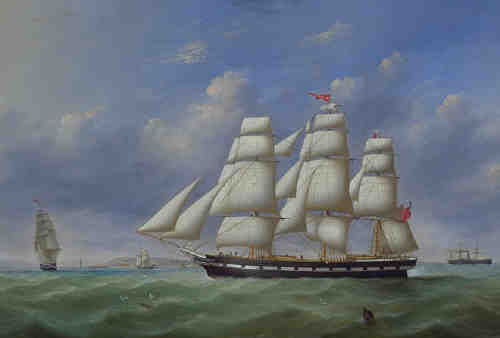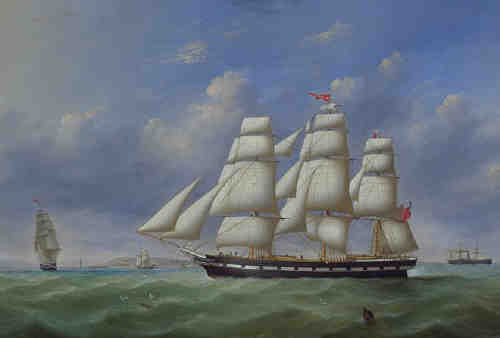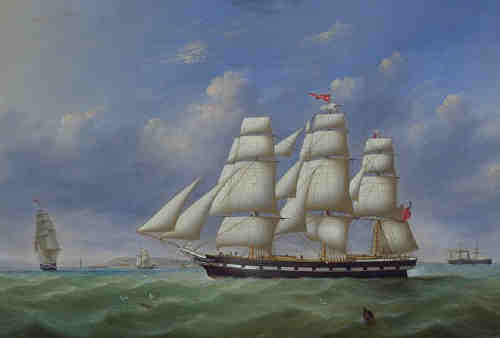
The Shergold Family Tree
 Sixth Generation
Sixth Generation 
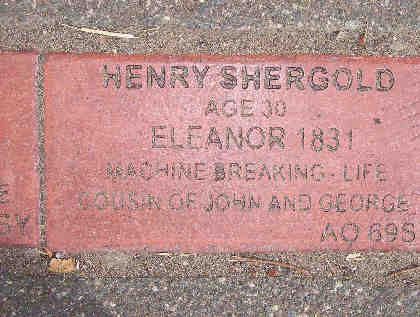
25. Henry SHERGOLD (CONVICT) 1,8,9,10,11,12 (James19, Richard14, Zachariah9, Robert2, John1) was born on 11 Feb 1799 in Wilton, Wiltshire, England,8,9,10 was baptised on 25 Dec 1806 in Wilton, Wiltshire, England, and died on 18 Feb 1873 in Back Creek, Sandhurst, Victoria, Australia, at age 74. The cause of his death was Cancer of the Throat.
Religion; Church of England.
Departure: Onboard the convict ship Eleanor, on 19 Feb 1831, in Portsmouth, England.
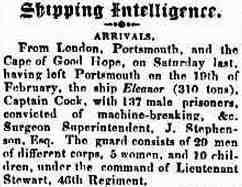
Convict Transportation: Convicted at Wilts, Special Gaol Delivery, 26 Jun 1831, Sydney, New South Wales, Australia. 14,15
The Life Of A Machine Breaker: 1831, Wilton, Wiltshire, England
The main industry in Wilton was carpet making. Following the advent of the industrial revolution many feared that the machines would force their redundancy. Henry and many of his relatives were obviously involved in this trade.
As Henry grew up in Wilton, these were the days before trade unions; he would have seen the continuing unrest amongst the workers as they rebelled against the introduction of this machinery.
As a last resort to 'bargaining' with their employers they destroyed the mill owners machines.
One particular aspect of this 'machine breaking' was known as Luddism - named after a mythical figure Ned Ludd. The first time that this name appeared was in 1811; Henry was 12 at the time, when letters threatening employers, signed 'Ned Ludd' were sent to the Nottingham Review.
There was an outbreak of stocking-frame breaking shortly thereafter. Although Luddism is today used as a euphemism for those who appose progress, it is no wonder that young Henry growing up in this state of industrial unrest was to become intimately involved.
A small entry in (T1/4194) PRO London states..; 'Henry Shergold, George Shergold, John Jennings, Thomas Whatley, James Down, Isaac Cole, William Francis, William Lewis convicted of Breaking machinery belonging to John Brasher of Wilton, for the Manufacture of Cloth, on the 24th November 1830 at a mill called Crowlane Mill in Wilton. They were arrested by 20 Special constables each of whom received £10.'
At his trial Henry stated that he had been 'Pressed' (forced) by the other men. (George Shergold was Henry's cousin, who was onboard the Eleanor with him, and it is suspected that William Francis was Henry's Brother-in-Law) Details of Henry's offence and trial.......
SHERGOLD Henry, age 30
TRANSPORT: ELEANOR
OFFENCE: 'charged on the oaths of Samuel Bracher and others, with having riotously and tumultuously assembled with other persons, and unlawfully demolished and destroyed a mill, engines and machinery therein, belonging to John Brasher, at Wilton.- Warrant dated November 25, 1830.'
SENTENCE: Death recorded, commuted to transportation for life.
A description of his 'convict indent' (?) is given as (AO NSW 4/4016). At this time Henry was described as being 31 years, and married with 5 children. The physical description given of him was that he was 5' 9.5 with a dark ruddy complexion, brown hair with dark brown eyes. His trade, or calling, was given as being Plough: reap; sow.
Further physical descriptions of Henry indicate that he had a 'raised mole' over his left eye, scars on the left side of his nose and his eyes were described as being dark hazel (which is consistent with previous descriptions). His convict No. was given as 31/869.
Henry could neither read nor write at this time.
On October 10, 1836 Henry received an 'Absolute Pardon' which was notified in despatch No.216 (PRO C0205/5 p.254)
Henry was later to become a Wood Carter. He died of 'Cancer in throat', and he had been seeing Dr James Boyd M.d. for approximately 5 months prior to his death.
His age at his death was incorrectly given as 77 years of age.
His death was registered on the 19th of February, 1873 at Sandhurst. His death was 'notified' by his neighbour.
WILTSHIRE SPECIAL COMMISSION - As reported in the Dorset County Chronicle, Thursday 6th January1831: 6 Jan 1831, Salisbury, Wiltshire, England
On Monday 3rd January, 1831 Henry Sheargold and his cousins George & John, stood before the Wiltshire Special Commission into Machine Breaking in the Wiltshire area.
The following events were reported in the
Dorset County Chronicle, Thursday 6th January 1831.
WILTSHIRE SPECIAL COMMISSION
SALISBURY, FRIDAY, Dec.31.
The Judges arrived in this city to-day, about a quarter before two o'clock. They were attended by the High Sheriff, and about 100 of the yeomen and gentry of the country, on horseback, and the carriages of several of the nobility closed the procession.
At the entrance of the city, they were met by the Mayor and Corporation, in eight carriages, who preceded the Learned Judges on their way to the Cathedral. The streets were lined on both sides by 400 of the special constables of the city.
At the Cathedral, they were received by the Dean, Canons, and other dignitaries.
An admirable sermon was preached on the occasion by the Sheriff's Chaplain, the Rev.M.Kitson, from 1 Peter, ch.ii., v.16, "As free, and not using your liberty for a cloak of mailiciousness, but as the servants of GOD." The Learned Judges afterwards retired to their lodgings.
The number of prisoners for trial amounts to 330.
(Gary Patton comment: The trials commenced on Saturday morning)
SATURDAY - This morning, the Commissioners, Mr.Baron Vaughan, Mr.Justice Parke, and Mr.Justice Alderson, the Marquess of Lansdowne, as Lord Lieutenant of the County, the Earl of Radnor, and T.G.B.Estcourt, Esq., took their seats in the Nisi Prius Court: immediately upon which the names of the Grand Jury were called over, and the following gentlemen answered, and were sworn:- John Benett,Esq.M.P., Sir.J.D.Astley,Bart.,M.P., Sir Edward Poore,Bart., Sir E.Antrobus,Bart., Wadham Wyndham,Esq.,M.P., Robert Gordon,Esq.,M.P., P.Methuen,Esq., G.W.Wroughton,Esq., William Wyndham,Esq., Alex Powell,Esq., E.Warrener,Esq., Harry Biggs,Esq., George Eyre,Esq., Wm.Fowle,jun.Esq., W.H.Ludlow,Esq., T.B.M.Baskerville,Esq., Geo.P.Scrope,Esq., Fulwar Craven,Esq., Geo.Monkland,Esq., Thomas Grove,jun.Esq., Charles Wyndham,Esq., Geo.Matcham,Esq., Ambrose Hussey,Esq.
The Proclamation against Vice and Immorality having been read, Mr.Justice Parke proceed to deliver the charge, which in substance was the same as that delivered by Mr.Baron Vaughan, at Winchester. His Lordship adverted to the spirit of insubordination which had existed in this country, and which had made it advisable to issue the special commission. It had been said, that these occurrences had been occasioned by distress. No doubt distress had prevailed; but at the same time it should be recollected that the acts which had been perpetrated had the very contrary effect to ameliorating the condition of those who suffered; and those who had been guilty of such conduct, when convicted, would have to suffer under the different penalties of that law which they had violated. The consequence had been, that the peaceable and well-disposed had suffered great losses, and an unusual degree of anxiety and alarm hd taken possession of men's minds, even in those parts of the kingdom which had been exempt from more immediate anxiety. He was sure that it was unnecessary for him to express the confidence he felt, that they, and all who were placed in a superior situation, would, not merely feel for the distress where it existed, with the kindness of fellow creatures, butwould exert themselves in every way to alleviate the misery of the poor, and remove the cause of it, which all were bound to do whom Providence had blessed with wealth and power. The spirit of insubordination had not been confined to those who were distressed, but (as was apparent in the adjoining county) a great many others, whose wages were such as to place them far above want, had joined with and excited those whose situations were not so good. Blacksmiths, carpenters, and artisans, and men in a superior condition of life, were to be found among the foremost of those who had been guilty of destroying machinery, and committing other outrages, and had endeavoured to destroy that bond of good will which ought to exist between the higher and lower classes of society. They had great reason to think, from what had been experienced in other places, that the farmers themselves had urged them on, with a view of obtaining a reduction of the rents and tithes. Such conduct ought not to be passed over with impunity; and if any such were present, they ought to know, that such violation of the law would not be permitted. The only remedy, under these circumstances, was to administer the law, and in performing these duties, they would proceed in the same manner as at an ordinary assize. They would forget all they had heard out of doors, and consider each case with calmness, and decide alone upon the evidence brought before them.
His Lordship then explained the law as it related to the different charges contained in the calendar, and the Grand Jury retired to their chamber.
(Gary Patton comment: a number of cases where heard over the following days. On Monday at 9 o'clock the first case heard was that of 17 year old John Ford, he was sentenced to removal from the country for the term of his natural life, second on the list was the case against Henry Shergold and his cousin George.)
Henry Shergold, 30; George Shergold, 25; James Down, 17; James Cole, 18; Wm.Lewis, 30; Thomas Whately, 17; John Jennings, 18; Wm.Jacobs, 31; and Wm.Francis, 31; stood indicted for having feloniously destroyed a mill, engines and machinery therin, the property of John Brasher, in the parish of Wilton, on the 25th of Nov.
The ATTORNEY-GENERAL state the case as detailed by the witnesses. Samuel Brasher, the son of John Brasher, who occupies Crow Lane Mill, where woollen-cloth is manufactured, stated that on the 24th Nov., a mob of about 500 men came there between two and four o'clock, armed with sticks and other weapons. Jennings was in front, and went into the mill with witness, and told him he was going to break the machinery, and make more work for the poor people. He said to witness, "Get out of the way, or I will break you to pieces," and ran into the mill, and laying hold of a bar of iron, began breaking the windows and the machines; he struck the carding engine, which was completely broken.
Witness saw George Shergold in the gig-house, in which were the stocks and the gig used in the manufactory; he had a stick in his hand, with which he struck the carding engine. Henry Shergold was also there with the handle of a brush in his hand, hooking some parts of the machinery which were broken and thrown out of the windows into the water. Saw Thos.Whately there with a stick, with which he broke the factory windows, James Down, Isaac Cole, and William Francis were part of the mob, and very active in destroying various parts of the machinery.
The mob broke several pairs of shears, about 3-4ths of a yard in length; out of one pair, two large hatchets were made. After the departure of the mob, witness found three scribbling engines and two carding engines so much damaged as to render them perfectly useless, and not worth repair. There were two tuckers broken; two billies, which were used for spinning, and the water-wheel were broken; five jennies and three or four reels completely destroyed; the shearing frames and the shears were also entirely demolished; the gig was so damaged as not to be worth repairing.
The amount of damage was £500.
Henry Jones corroborated the above testimony, and identified Henry Shergold and Lewis as being part of the mob.
Charles Viney saw George Shergold and John Jennings, throwing machinery out of the window of the factory, also saw William Jacobs, but did not observe him do any thing.
Jennings said this witness would swear black was white.
George Brasher son of the prosecutor, proved that the prisoners Jennings, George Shergold, Henry Shergold, and Down, were particularly active in the destruction of the machinery.
Jennings asked the witness, what he could swear to him by his clothes or features. The witness said he took particular notice of him; Jennings then said that witness would swear any thing - and told him to make a Jury believe him if he could. He (the prisoner stood there to be tried for his life, not to be sworn falsely against.
This closed the case for the prosecutor.
Jennins in his defence said that the two last witnesses had sworn falsely against him; no person could tell how much had been falsely sworn against him.
George Shergold said that the two last witnesses had sworn more false than true against him, and that they would find out some day; they didn't know the value of an oath.
Henry Shergold said, that when he was committed to prison George Brasher said, before the Magistrate, that he could not swear to him; he was not there till it was almost over, and was pushed in with the crowd; he never touched any thing.
The other prisoners said they were pressed by the mob.
Jacob produced a written defence, in which he said that he was led into the misfortune - the mob had threatened to throw him into the river - and for the sake of his wife and family he hoped that mercy would be extended to him.
The ATTORNEY GENERAL said, that since the bill of indictment was preferred, they had ascertained Jacob's story to be correct, and he should not, therefore, press the case against him.
James Rogers had know the prisoner Down for seven of eight years, he had always borne a good character.
Wm.Taylor, a farmer, said that Wm.Francis was a very quiet, honest, young man, and a very good servant.
Wm.Thring had known W.Lewis ten or twelve years; he had worked for witness the greatest part of that time; he was a very good labourer; the witness knew nothing against his honesty, and could not say much about his quietness.
Mr.Justice ALDERSON summed up, and the Jury returned the following verdicts: John Jennings, George Shergold, Henry Shergold, Thomas Whately, James Down, Isaac Cole, Wm.Francis and W.Lewis, Guilty: Wm.Jacobs, Not Guilty; and recommended Wm.Lewis to mercy.
THE CHARGE TO THE GRAND JURY.
J.Benett,Esq.,M.P., the foreman of the Grand Jury, came on the Bench, and addressed the Court in these terms: Mr.Justice James Parke - As the foreman of the Grand Jury, I have a most pleasing duty to perform, which is to read a paper they have written, and which I will now do.
"The Grand Jury beg leave to present their thanks to Mr.Justice James Parke for his able charge delivered on Saturday; thinking that such a clear exposition of the law would at this time be highly useful to all orders of the community; they request his Lordship will allow then to have it printed." In which request and thanks I beg my Lord most cordially to join.
Upon which Mr.Justice Parke immediately bowed and assented.
King v. Carlile - A Defence of the Machine Breakers (Sussex Advertiser, Monday 17 Jan 1831): 10 Jan 1831, !Fix this Location - 1
In a "celebrated" case at the Old Baily on the 10th of January, 1831 the following extract provides a wonderful insight into the way in which the Machine Breakers and Insurgent Agricultural
LIBEL - THE KING v. CARLILE
This case being appointed for trial at ten o'clock this morning, the Court was in consequence very much crowded. The bench was filled with Magistrates, amongst whom were Sir Richard Birnie, Mr.Rawlinson, Mr.Twyford, &c. Carlile was in attendance at the sitting of the Court, and previous to the case being called on was in constant conversation with his friend, the Rev.Robert Taylor, of "Rotunda" celebrity, who appeared to take a deep interest in the proceedings of the day.
At the conclusion of a trial for a petty theft a Middlesex Jury was empannelled, and the trial of King v. Carlile called on. Before they were sworn Carlile addressed te Jury.
The following was part of that address.
As report in the Sussex Advertiser, Monday 17th January, 1831
The following libels were put in and read by Carlile,:-
"TO THE INSURGENT AGRICULTURAL LABOURERS"
"You are much to be admired for every thing you are known to have done during the last month; for, as yet, there is no evidence before the public that you are incediaries, or even political rebels.
Much as every thoughtful man must lament the waste of property, much as th country must suffer by the burnings of farm produce now going on, were you proved to be incendiaries we should defend you by saying, that you have more just and moral cause for it than any king or faction, that ever mad war, had for making war. In war, all destructions of property are counted lawful, upon the ground of that which is called the law of nations.
Yours is a state of warfare, and your ground of quarrel is the want of the neccessaries of life in the midst of an abundance. You see hoards of food and you are starving. You see a Government rioting in every sort of luxury and wasteful expenditure; and you, ever ready to labour, cannot find one of the comforts of life.
Neither your silence nor your patience has obtained for you the least respectful attention from that Government. The more tame you have grown the more you have been oppressed and despised, the more you have been trampled on; and it is only now, that you begin to display your physical as well as your moral strength, that you cruel tyrants treat with you and offer terms of pacificationl
Your demands have been, so far moderate and just; and any attempt to stifle them, by the threatened severity of the New Administration will be so wicked as to justify your resistance even to death, and to life for life.
Perserve in your moderate demands. Go on as you have begun; and learn, not only in precept, but in your own example, that great political sentiments of Thomas Paine - the greatest political friend of the labouring man that ever put pen to paper for his instruction - that "for a nation to be free, it is sufficient that she wills it."
Mr. Carlile justified the conduct of the agricultural labourers of the disturbed counties, and alluding to Earl Grey's threatened severity, he trusted, that, if an effert were made to put down the just discontent of those starving labourers by any other means than that of redressing their grievances, they might be able to rise in their congregated strength and put down the Earl. This observation was too plain, bold, and honest not to find its merited applause.
SENTENCED TO DEATH - As reported in Bell's Life in London & Sporting Chronicle: 16 Jan 1831, Salisbury, Wiltshire, England
Though convicted on the 3rd of January, Henry & George were not sentenced. That was to occur on Monday 10th of January at Salisbury. It was at this time that John Sheargold was also sentence. The sentence, DEATH.
The following account is a heart-felt account of what occurred on that day.
Bells's Life In London and Sporting Chronicle, Sunday 16th January 1831
THE AGRICULTURAL RIOTERS.
SALISBURY SPECIAL COMMISSION - The proceedings under this commission were closed on Monday, when the prisoners who had not received sentence were brought up.
The Court was crowded to excess, & on several being sentenced to transportation, the scene of distress among the prisoners, their wives, and friends, was most painful.
Upon Peter Withers, aged 23, and James Lush, aged 40, being put to the bar, and the Judges, assuming their black caps, the feelings of the auditors became most awfully impressed. On being asked why they should not receive judgement to die according to law, Mr.H.Ball, who appeared for Peter Withers, made an application for the respite of the judgement against him, on the ground that words had been introduced into the indictment which were not used in the Act of Parliament. Thus the Act stated, that any many who should strike any one with a sharp instrument, with intent to maim, cut, stab, or disfigure him, should be guilty of felony. In the present case, the indictment charged the prisoner with having struck one Oliver Codrington, with intent to stab, murder, or wound him with a hammer. The word wound was not mentioned in the Act; and the hammer, being a blunt instrument, could not stab or cut. It would be saying too much, if a licences was given to insert words in this way, merely because the case was of such a nature as to require it. -
The Judges said, the application was made at an untimely period; but, as it involved a very nice question, they would take time to consider, and the prisoner would be respited till they had come to a determination on the point.
- Mr.Baron Baughan then addressed the prisoners in the most impressive manner on the enormity of their offences, which were aggravated by robbery, attended with personal violence. He intimated that the gates of mercy had been closed against them for ever, unless the objection in favour of Wethers should avail. Immediately upone the sentence being concluded, Withers, who had been for some time holding up his hands in a supplicating attitude, sunk back absorbed in grief; for some time his face had been continually changing colour, but at last it assumed a death-like paleness: from narrowly watching him, it was evident his sufferings must have been most dreadful. He was led from the bar. - Lush, from the first moment of his appearing at the bar, was much affected; from the time of the Judges putting on their caps until the conclusion of the sentence, he had leaned entirely over the bar in a state of anguish not to be described: his sobs were dreadful, and his acclamation of "Mercy ! oh God, have mercy on me !" accompanied by his piercing groans, thrilled through the hearts of all. Lush was removed from the bar in a stooping position, as if pain prevented him from standing erect. - A more awful and afflicting scene was perhaps never witnessed than the Court presented as the Judge proceeded with the sentence.
Judgement of Death was then recorded against the following prisoners: - James Toomer, John Jennings, George Shergold, Henry Shergold, Thomas Whatley, James Down, Isaac Cole, William Francis, William Lewis, J.Miller, Thomas Piggott, J.Romain, John Shergold, Thomas Goddard, William Taylor, Elias Thorn, David Gee, Jeremiah New, Worthy Gee, George Durmer, George Toomer, William Cheater, Charles Pizzie, and Shadrach Blake.-
On leaving the Court we mixed among the crowd, who were waiting to see the prisoners leave. The scene here was heart-breaking beyond every thing. A mass of women were standing bathed in tears, supported by men, who looked as having hearts which nothing could daunt, but which had given way to feelings of their better nature, and in endeavouring to support the weaker sex, they themselves could not betray their grief, and were actually shedding the tears of pity and affliction.
At length the cell door was opened, and the unfortunate criminals appeared, chained together. We thought that in the Court, and before the door was opened, we had seen distress of mind in almost every form; we had witnessed it in those who had given way to it, and had let the bursting tear escape; we had also watch those who, having more command of themselves, had prevented the outward show of grief, but in whose countenances what they felt inwardly could easily be discovered. But we had a sight to witness even more distressing than all this.
As the men came out, their wives, their mothers, their sisters and their children, clasped them in their arms with an agonizing gripe. The convicts, whose hearts had not been hardened by having before been incarcerated in a gaol, gave way; they wept like children, they no longer attempted to stifle their feelings or brave their doom - nature had begun to play with every force, and the heart was broken. It required every effort on the part of their attendants to get them into the car, and at last the door was closed; then we could hear the exclamations of regret, and of farewell. and many a female hand was forced through the bars to take a last grasp of him who was now about to leave those who were dear to him, and to whom he was a dear, for ever.
PLEAS FOR CLEMENCY: 1 May 1831, Wilton, Wiltshire, England
A number of petitions or letters were sent for the clemency regarding Henry's sentence.
These include letters from....
J Stockwell, curate of Wilton, dated May 1, 1831. A request from his wife and family to be sent out to join him. He says that part of the reward that was given for the apprehension of the offenders was given to the wives who are most willing to give their allotted portion towards the cost of their passage. The parish is also willing to contribute. The wife is Fanny Shergold, age 31 and there are five children, four girls and one boy, the eldest 10 years old the youngest 6 months. (PRO PCI/79).
A letter from John Brasher, Henry's prosecutor, dated March 1, 1831, on behalf of Henry. He says in the letter that he had no idea that the sentence would be so severe. He has known the family for many years and has not had a moment's peace of mind since the sentence was passed.
My Lord,
I was the prosecutor in the case of Henry Shergold, and I confess that I had not the slightest idea that his sentence would have been so severe, for having known the Family so many years particularly the person. I imagined a more slight punishment would have been inflicted on him, I candidly confess that I have not had a moment's peace of mind since the passing of his Sentence, I sincerely hope that you will grant the prayer of the Petitioner
I am
My Lord,
Your most Obedient Servant
John Brasher
A petition was also signed by John Brasher, William Seagrim, Thomas Blackmore, James Ward, William Viney and James Viney in support of Henry.
To the Right Honorable the Secretary of State for the Home Department.
My Lord,
We the undersigned respectfully., (assisfilore ?)... you to represent to His Most Gracious Majesty our earnest request that he would be pleased to extend his clemency towards Henry Shergold now on board the Eleanor at Portsmouth, he has five children the oldest only 11 years of age and be pleased to Mitigate his sentence of Transportation for life to such period as His Majesty in his Wisdom may think fit, and your Petitioners as., (are ?).. duty bound shall earn pray....
John Brasher, Wm Seagrim, Thomas Blackmore, James Ward, William Viney, James Viney.
Fanny sent a letter, dated March 1, 1831; in it she enclosed the petition and the letter from John Brasher. (PRO HO17/73 Pt.l Np28). It is obvious that the letter was written by someone other than Fanny, as on the letter she is only capable of making her 'mark' which indicates that she was illiterate, as many were.
My Lord,
The enclosed Petition contains the wishes of many who have known my Husband and who are most conscious for a Mitigation of his Sentence, it also contains a letter from the Prosecutor in which he earnestly Solicits that the prayer of us may be granted
I am
My Lord
Your most Obedient Servant hit (?)
Fanny + Shergold mark
Henry married Fanny FRANCIS 4,5,6,16,17 on 10 Apr 1820. Fanny was born in 1799 in Wilton, Wiltshire, England4,5,6 and died in Jan 1896 in Wiltshire, England,4 at age 97.
Events
1851: Fanny resided at Southwark St Olave, Southward St Saviour, and Southwark St Thomas, Surrey, England. 6
1841: Fanny resided at Great Wishford, Wiltshire, England. 5
Children from this marriage were:
+ 30 i. Ann SHEARGOLD 2 was born on 13 Mar 1820 in Wilton, Wiltshire, England2 and was baptised on 25 Dec 1820 in Wilton, Wiltshire, England.2
+ 31 ii. Henry SHERGOLD 2 was born on 23 Sep 1822 in Wilton, Wiltshire, England2 and was baptised on 13 Oct 1822 in Wilton, Wiltshire, England.2
+ 32 iii. Mary SHERGOLD 1,2 was born on 8 Feb 1825 in Wilton, Wiltshire, England2 and was baptised on 27 Feb 1825 in Wilton, Wiltshire, England.2
+ 33 iv. Elizabeth SHERGOLD 2,5 was born on 18 Aug 1827 in Wilton, Wiltshire, England2,5 and was baptised on 9 Sep 1827 in Wilton, Wiltshire, England.2
+ 34 v. Harriet SHERGOLD 2,18,19 was born in 1830 in Wilton, Wiltshire, England2,18,19 and was baptised on 5 Dec 1830 in Wilton, Wiltshire, England.2
Henry next married Ellen SCULLY (CONVICT),1,20 daughter of SCULLY, after 1836 in Victoria, Australia. Ellen was born in 1817 in Cork Cork, Ireland20 and died on 3 Jan 1865 in Quarry Hill, Sandhurst, Bendigo, Victoria, Australia,20 at age 48. The cause of her death was Disease of the LIver.
It is supected that Ellen's maiden name may have been Colley.
Ellen died of 'disease of Liver' from which she suffered for 5 months leading up to her death. She was treated by a John Forily (?) who consulted her last on the 1st of January. On her daughter's, Ellen, marriage certificate it lists Ellen's maiden name as Jones
Events
Ellen immigrated Onboard the Andromeda - Sentenced to 7 years in 1834.
Children from this marriage were:
+ 35 i. Samuel Henry SHEARGOLD 1,21 was born on 12 Dec 1839 in Sydney, New South Wales, Australia and died in 1917 in Euroa, Victoria, Australia, at age 78.
+ 36 ii. John SHEARGOLD 1,22 was born in 1840 in Hindmarsh, South Australia, Australia and died on 22 Apr 1919 in Waterfall Sanatorium, New South Wales, Australia,22 at age 79.
+ 37 iii. James SHEARGOLD was born about 1842 and died in 1891, aged about 49.
+ 38 iv. Elizabeth SHEARGOLD was born about 1844 in Adelaide South Australia.
+ 39 v. Jane SHEARGOLD was born about 1847 and died in 1902 in Bendigo, Victoria, Australia, aged about 55.
+ 40 vi. William SHEARGOLD 22 was born in 1850 in Adelaide South Australia22 and died on 16 Aug 1888 in Bendigo, Victoria, Australia,22 at age 38.
+ 41 vii. Ellen SHEARGOLD was born in 1853 in Sandhurst, Victoria, Australia, died on 28 Aug 1918 in Richmond, Victoria, Australia, at age 65, and was buried in Box Hill Cemetery, Box Hill, Victoria.
+ 42 viii. Alfred SHERGOLD 1 was born in 1857 in Victoria, Australia and died on 25 Jan 1930 in Kew, Melbourne, Victoria, Australia, at age 73.
26. James SHERGOLD 1,13 (James19, Richard14, Zachariah9, Robert2, John1) was born on 18 Apr 1805 in Ditchampton, Wilshire, England,13 was baptised on 25 Dec 1806 in Wilton, Wiltshire, England, and died in 1852, at age 47.
Events
1851: James resided at Wilton, Wiltshire, England. 13
James married Mary Ann SILVERTON 1 on 12 Sep 1824 in Wilton, Somerset, England. Mary was born on 16 Jun 1802 in Wilton, Wiltshire, England.
Children from this marriage were:
+ 43 i. Jane SHERGOLD 1 was born on 30 Sep 1827 in Wilton, Wiltshire, England.
+ 44 ii. James SHERGOLD 1 was born in 1830 in Wilton, Wiltshire, England and died on 16 Apr 1830.
+ 45 iii. Hannah Sophia SHERGOLD 1 was born in 1834 in Wilton, Dorset, England.
+ 46 iv. Jemima SHERGOLD 13 was born about 1834 in Wilton, Wiltshire, England.13
_Brick_2.jpg)
27. George SHERGOLD (CONVICT) (William21, Richard14, Zachariah9, Robert2, John1) was born in 1807 and died on 17 Jan 1865 in Sydney, New South Wales, Australia, at age 58.
Departure: Onboard the convict ship Eleanor, 19 Feb 1831, Portsmouth, England.
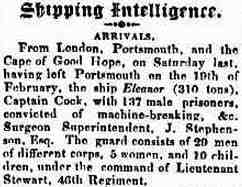
Convict Transportation: Convicted at Wilts, Special Gaol Delivery, on 26 Jun 1831, in Sydney, New South Wales, Australia. 14,15
_Brick_2.jpg)
28. George SHERGOLD (CONVICT) (Joseph23, Richard14, Zachariah9, Robert2, John1) was born in 1805 in Stapleford, Wiltshire, England, died on 31 Aug 1891 in Coyle's Buildings, Miller Street, St.Leonards, New South Wales, at age 86, and was buried on 1 Sep 1891 in St. Thomas's Cemetery, St.Leonards, New South Wales.
George was transported on the "Eleanor" with his brother John and his cousins.
Name: George Shergold
Age: 25
Date of Conviction: 27 Dec 1830
Place of Conviction: Salisbury
Estimated birth year: abt 1805
Vessel: Eleanor
Port of Arrival: Sydney
Date of Arrival: 1831
Departure: Onboard the convict ship Eleanor, on 19 Feb 1831, in Portsmouth, England.
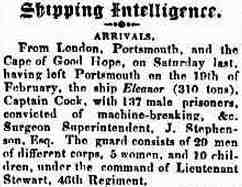
Convict Transportation: Convicted at Wilts, Special Gaol Delivery, on 26 Jun 1831, in Sydney, New South Wales, Australia. 14,15
The Life Of A Machine Breaker: 1831, Wilton, Wiltshire, England
The main industry in Wilton was carpet making. Following the advent of the industrial revolution many feared that the machines would force their redundancy. Henry and many of his relatives were obviously involved in this trade.
As Henry grew up in Wilton, these were the days before trade unions; he would have seen the continuing unrest amongst the workers as they rebelled against the introduction of this machinery.
As a last resort to 'bargaining' with their employers they destroyed the mill owners machines.
One particular aspect of this 'machine breaking' was known as Luddism - named after a mythical figure Ned Ludd. The first time that this name appeared was in 1811; Henry was 12 at the time, when letters threatening employers, signed 'Ned Ludd' were sent to the Nottingham Review.
There was an outbreak of stocking-frame breaking shortly thereafter. Although Luddism is today used as a euphemism for those who appose progress, it is no wonder that young Henry growing up in this state of industrial unrest was to become intimately involved.
A small entry in (T1/4194) PRO London states..; 'Henry Shergold, George Shergold, John Jennings, Thomas Whatley, James Down, Isaac Cole, William Francis, William Lewis convicted of Breaking machinery belonging to John Brasher of Wilton, for the Manufacture of Cloth, on the 24th November 1830 at a mill called Crowlane Mill in Wilton. They were arrested by 20 Special constables each of whom received £10.'
At his trial Henry stated that he had been 'Pressed' (forced) by the other men. (George Shergold was Henry's cousin, who was onboard the Eleanor with him, and it is suspected that William Francis was Henry's Brother-in-Law) Details of Henry's offence and trial.......
SHERGOLD Henry, age 30
TRANSPORT: ELEANOR
OFFENCE: 'charged on the oaths of Samuel Bracher and others, with having riotously and tumultuously assembled with other persons, and unlawfully demolished and destroyed a mill, engines and machinery therein, belonging to John Brasher, at Wilton.- Warrant dated November 25, 1830.'
SENTENCE: Death recorded, commuted to transportation for life.
A description of his 'convict indent' (?) is given as (AO NSW 4/4016). At this time Henry was described as being 31 years, and married with 5 children. The physical description given of him was that he was 5' 9.5 with a dark ruddy complexion, brown hair with dark brown eyes. His trade, or calling, was given as being Plough: reap; sow.
Further physical descriptions of Henry indicate that he had a 'raised mole' over his left eye, scars on the left side of his nose and his eyes were described as being dark hazel (which is consistent with previous descriptions). His convict No. was given as 31/869.
Henry could neither read nor write at this time.
On October 10, 1836 Henry received an 'Absolute Pardon' which was notified in despatch No.216 (PRO C0205/5 p.254)
Henry was later to become a Wood Carter. He died of 'Cancer in throat', and he had been seeing Dr James Boyd M.d. for approximately 5 months prior to his death.
His age at his death was incorrectly given as 77 years of age.
His death was registered on the 19th of February, 1873 at Sandhurst. His death was 'notified' by his neighbour.
FIVE SHIILING EXTORTION: 3 Jan 1831, Salisbury, Wiltshire, England
On the same day that Henry Shergold was convicted of Machine Breaking, and in the case immediately following that, George and his brother John were convicted of the extortion of 5 shillings.
Morning Post, Thursday 6th January 1831
SPECIAL COMMISSION FOR WILTS
SALISBURY
John Shergold, 22; George Shergold, 28; and John Day, 22; were indicted for extorting money (5s.) from Christopher Ingram.
The ATTORNEY-GENERAL state the case.
Charles Beale said that he was a present out of employ, but had been a keeper of stage coach horses at Stapleford; that a "main lot" of persons came to him about ten o'clock at night, among whom was the Prisoner John Shergold, who said he would knock him down if he did not go with them.
Witness said he would not go.
They ultimately, however, made witness go with them to Mr.Saph's at Stapleford, and then they went to Mr.Ingram's; the three Prisoners were of the party. John Shergold called Mr.Ingram up (who was in bed) and asked him to give them some drink.
Mr.Ingram opened the window and asked the mob what they wanted. John Shergold said they wanted something to drink. Mr.Ingram said he would give them 5s. and threw it out of the window wrapped in paper. When the money was thrown out the mob could not find it, until Mr.Ingram let down a light from the window; John Shergold found it. They then went to Berwick; there were many persons there.
Mr.Christopher Ingram deposed to being awakened at half-past three o'clock in the morning, and to his having given, through fear, 5s. George Shergold said he was captain.
The witness corroborated the last witness's evidence.
George Shergold said this this as false as God was true.
Other witnesses having made out the case, the Prisoners were called on for their defence, but the said nothing.
Day received a good character.
Mr.Baron Vaughan summed up, and the Jury returned a verdict of Guilty against George Shergold and John Shergold, and acquitted John Day.
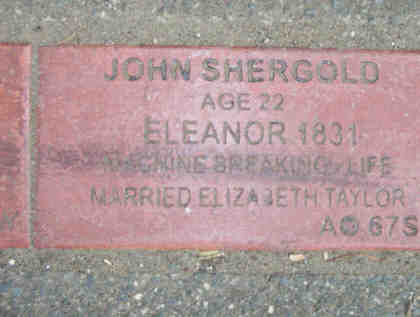
29. John SHERGOLD (CONVICT) (Joseph23, Richard14, Zachariah9, Robert2, John1) was born in 1809 in Stapleford, Wiltshire, England.
Y
Convict Transportation: Machine Breaking, 1830, Wilton, Wiltshire, England.
John arrived in Sydney onboard the Eleanor on June 25, 1831 and into Van Dieman's Land peer the Hind in 1832. He was aged 25 in 1834, was 5'4" in height, had light brown hair and eyes, was a labourer and was tried at Salisbury on December 27th, 1830 and sentenced to life. (Con 31/29;84/1).
In the convict record Con 78/3, the spelling is Sheargold and the sentence 14 years. He was tried in the Quarter Sessions, Launceston September 19, 1844 for aggravated assault and was sentenced to imprisonment for 6 months (LC 343/1).
John was later to become a Blacksmith, he was recorded as being a Blacksmith as early as 1843.
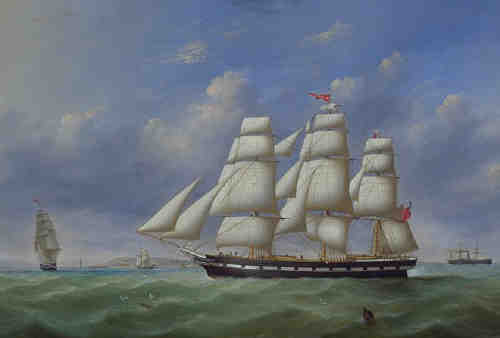
Departure: Onboard the convict ship Eleanor, on 19 Feb 1831, in Portsmouth, England.
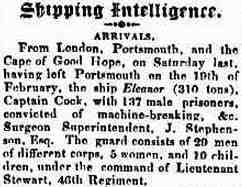
Convict Transportation: Convicted at Wilts, Special Gaol Delivery, on 26 Jun 1831, in Sydney, New South Wales, Australia. 14,15
The Life Of A Machine Breaker: 1831, Wilton, Wiltshire, England
The main industry in Wilton was carpet making. Following the advent of the industrial revolution many feared that the machines would force their redundancy. Henry and many of his relatives were obviously involved in this trade.
As Henry grew up in Wilton, these were the days before trade unions; he would have seen the continuing unrest amongst the workers as they rebelled against the introduction of this machinery.
As a last resort to 'bargaining' with their employers they destroyed the mill owners machines.
One particular aspect of this 'machine breaking' was known as Luddism - named after a mythical figure Ned Ludd. The first time that this name appeared was in 1811; Henry was 12 at the time, when letters threatening employers, signed 'Ned Ludd' were sent to the Nottingham Review.
There was an outbreak of stocking-frame breaking shortly thereafter. Although Luddism is today used as a euphemism for those who appose progress, it is no wonder that young Henry growing up in this state of industrial unrest was to become intimately involved.
A small entry in (T1/4194) PRO London states..; 'Henry Shergold, George Shergold, John Jennings, Thomas Whatley, James Down, Isaac Cole, William Francis, William Lewis convicted of Breaking machinery belonging to John Brasher of Wilton, for the Manufacture of Cloth, on the 24th November 1830 at a mill called Crowlane Mill in Wilton. They were arrested by 20 Special constables each of whom received £10.'
At his trial Henry stated that he had been 'Pressed' (forced) by the other men. (George Shergold was Henry's cousin, who was onboard the Eleanor with him, and it is suspected that William Francis was Henry's Brother-in-Law) Details of Henry's offence and trial.......
SHERGOLD Henry, age 30
TRANSPORT: ELEANOR
OFFENCE: 'charged on the oaths of Samuel Bracher and others, with having riotously and tumultuously assembled with other persons, and unlawfully demolished and destroyed a mill, engines and machinery therein, belonging to John Brasher, at Wilton.- Warrant dated November 25, 1830.'
SENTENCE: Death recorded, commuted to transportation for life.
A description of his 'convict indent' (?) is given as (AO NSW 4/4016). At this time Henry was described as being 31 years, and married with 5 children. The physical description given of him was that he was 5' 9.5 with a dark ruddy complexion, brown hair with dark brown eyes. His trade, or calling, was given as being Plough: reap; sow.
Further physical descriptions of Henry indicate that he had a 'raised mole' over his left eye, scars on the left side of his nose and his eyes were described as being dark hazel (which is consistent with previous descriptions). His convict No. was given as 31/869.
Henry could neither read nor write at this time.
On October 10, 1836 Henry received an 'Absolute Pardon' which was notified in despatch No.216 (PRO C0205/5 p.254)
Henry was later to become a Wood Carter. He died of 'Cancer in throat', and he had been seeing Dr James Boyd M.d. for approximately 5 months prior to his death.
His age at his death was incorrectly given as 77 years of age.
His death was registered on the 19th of February, 1873 at Sandhurst. His death was 'notified' by his neighbour.
John married Elizabeth TAYLOR on 22 Feb 1842 in St Johns Church, Launceston, Tasmania, Australia. Elizabeth was born in 1823 and died on 27 Jul 1843 in Launceston, Tasmania, Australia, at age 20.
Registration No: 1360/1842. On the register of the marriage John was listed as being a Labourer aged 30, and Elizabeth's age was given as 19 years. It is strongly believed that John was a cousin to Henry & James Shergold.
Y
Children from this marriage were:
+ 47 i. Emanuel SHERGOLD was born on 15 Feb 1843 in Patterson's Plains, Tasmania, Australia.
+ 48 ii. Sarah Ann SHERGOLD was born on 3 Aug 1847.
First online edition published by © Gary Ian Patton, 1992, revised in 2004, 2007, 2009 2017.
Current edition 2024.
All rights reserved.
Home | Table of Contents | Surnames | Name List
This website was created 16 Jan 2024 with Legacy 9.0, a division of MyHeritage.com; content copyrighted and maintained by family@garypatton.net
